WHAT IS A MARRIAGE AND FAMILY THERAPIST? Marriage and Family Therapists broaden the traditional emphasis on the individual to attend to the nature and role of individuals in primary relationship networks such as marriage, parenting, relationships, and the family. MFTs take a holistic perspective to health care; they are concerned with the overall, long-term well-being of individuals and their families.
WHAT IS EMOTIONAL THERAPY? Emotionally focused therapy is a form of psychological counseling that encourages one to identify both positive and negative emotions and identify how these emotions may be affecting a behavior. Emotional therapy is not all about seeking the good feeling and avoiding the bad. In fact, many emotional therapy sessions help an individual recognize that avoiding the “bad” feelings may actually cause mental or physiological damage and result in destructive behaviors that affect those around you.
WHY IS EMOTIONAL THERAPY IMPORTANT? Emotional focused therapy is often led by a marriage and family therapist and is one form of psychological counseling. This can be done as an individual or in a group. Maintaining a healthy marriage and being an attentive and attached parent is hard work and has its normal ups and downs. Having a special needs child can increase the challenges of everyday life. Studies have shown significantly higher rates of divorce in couples that have a special needs child.
A core philosophy of Children’s Therapy Network is recognizing the child is only one part of a whole family, and to treat the child, you have to treat the whole family. It’s no secret that children typically are more successful in life when they have a solid supportive and functional family. That’s why the therapists at CTN are trained to identify when a family is struggling emotionally, and strongly encourage seeking emotional therapy. When you’re an emotionally healthy parent, your children will benefit.
Our individual child and family counseling program are geared towards helping families become the best they can be, by giving parents and children tools for success. Starting intervention early provides children, adolescents and their parents the keys to help them thrive in school and home life. Wherever a family finds themselves, counseling can provide encouragement and support to create a more loving and successful home.
What Are Social-Emotional Skills?
Social-emotional skills are required to connect with others. Having good social emotional skills allow us to have positive connections with others. We need social emotional skills to manage our emotions, build healthy inner-personal relationships, have positive self-esteem, and feel empathy for others.
Some examples of social-emotional skills are:
- Recognizing if someone is sad, and asking if they’re ok
- Understanding and expressing your own feelings to your friends and family.
- Understanding your thoughts and feelings, and being able to relate to others
Social-Emotional Basics
These skills start at birth and continue to develop well into adulthood. Early development of these skills lay the foundation and wire the brain for later skill building.
As soon as babies begin interacting with the people who care for them, they begin to understand and recognize thoughts and feelings. Babies are born with instinctual ways to connect with adults to ensure their survival. As adults respond to a baby’s basic needs, they set the foundation of a baby’s security in their environment. Early experiences with family, caregivers, and peers greatly impact social and emotional development.
See Maslow’s hierarchy of needs.
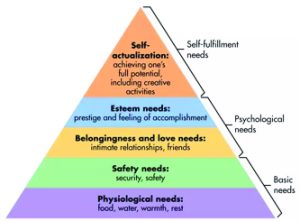
Parents help to nurture social-emotional skills through a child’s life, so kids can develop healthy relationships with friends and family members. Even as a baby, they learn how you respond to their social and emotional needs. They notice how safe they feel at home and in your presence. They learn how to feel empathy, recognize emotions and say “I’m sorry” by following your lead. They also learn to laugh and feel joy by following your lead.
While early experience lay the foundation for social emotional development, throughout our lives we continue to be shaped by our experiences! These experiences can include meeting new people who have a great impact on your life, overcoming difficult situations, or even raising children, or caring for a loved one.
Why are healthy social emotional skills important?
- Show higher success in school
- Make friends and keep friendships
- Gain confidence
- Resolve conflicts
- Manage stress and anxiety
- Learn socially appropriate norms.
- Make appropriate decisions
- Resist negative social pressure
- Learn strengths and weaknesses
- Gain awareness of what others are feeling
Things you can do at home with your child now:
- Be a model of the emotions and behaviors you want your child to show. You are your child’s first teacher and they look up to you as a role model.
- Be responsive to your child’s emotions and behaviors. Responding will help to develop trust between you and your child.
- Ask open-ended questions, such as “What would you do?” to help develop problem-solving skills.
- Use stories to talk to your child about different social situations and how each person might be feeling.
- Encourage kids to try new things and learn how much they can do.
- Play games to teach kids how to take turns, win and lose, share, and negotiate.
- Ask your child questions when they are upset. These questions can be about why they are upset, or offering alternatives to understand the root of their unhappiness. For example, “Would you like to brush your teeth or take a bath first?”
- Sit with your child when using a screen (not recommended before 18 months) and make it a social activity, e.g. asking them questions or playing turn-taking games.
Is Your Child Meeting their Social-Emotional Abilities?
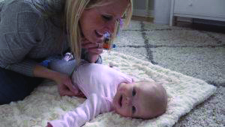
- Begins to smile in response to their caregivers (this is also known as a “social smile”)
- Develops more facial and body expressions
- Can briefly calm themselves, e.g. sucking on thumb
- Recognizes they are having fun and may cry when playing stops
- Makes eye contact and looks at people while interacting
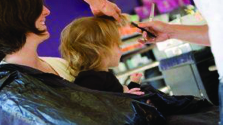
- Is usually happy when surrounded by cheerful caregivers
- Responds to and copies some movements and facial expressions
- Develops an awareness of their surroundings and expresses a desire to engage, e.g. banging objects or toys
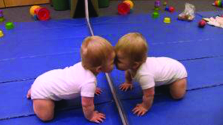
- May show anxiety around strangers
- Plays social games, e.g. peek-a-boo
- Learns the meaning of words when they’re used consistently
- Enjoys looking at self in a mirror
- Becomes more “clingy” when leaving caregiver, e.g. reaches for caregiver when being held by someone else
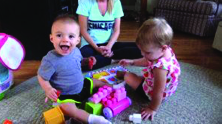
- Attempts to display independence, e.g. crawling for exploration or refusing food
- May show fear around unfamiliar people and objects
- Tries to get attention by repeating sounds and gestures
- Enjoys imitating people in play
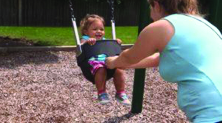
- Shows defiant behavior to establish independence, e.g. having tantrums
- Does not understand what others think or feel and believes everyone thinks as he does, e.g. gets upset when no longer the center of attention
- Enjoys being around other children, but not yet able to share easily
- Can play independently for brief periods of time
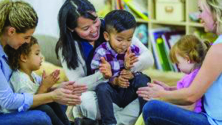
- Copies others in more complex tasks, e.g. cleaning, cooking, self-care
- Shows affection towards friends
- Shows an increasing variety of emotions
- Upset when there are major changes in routine
- Seems concerned about personal needs and may even act “selfishly”
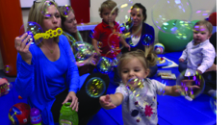
- Starts cooperating more with others during play, e.g. sharing toys
- Can sometimes work out conflicts with other children, e.g. taking turns in small groups
- Uses words to communicate needs instead of screaming, grabbing, or whining
- Becomes more independent in daily activities, e.g. may choose own clothes to wear
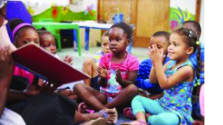
- Has more developed friendships and maybe even a “best friend”
- More cooperative with rules
- Understands and is sensitive to others’ feelings
- Understands the difference between real life and make believe
- Has changes in attitude, e.g. is demanding at times and cooperative at times
What If My Child is Struggling?
The sooner your child receives help in developing their social-emotional skills, the better off their health and well-being will be. Your healthcare provider may be able to help you address the issue or refer you someone who can help. Here are a few examples of specialists who may be able to help your child:
-
- Child psychologist or Family Therapist
- Occupational therapist
- Speech-language pathologist
- Developmental and behavioral pediatrician
- Social worker
- Neuropsychologist
- Psychiatrist
Monthly newsletter
Sign up to receive updates, including tips and activities for your little ones.